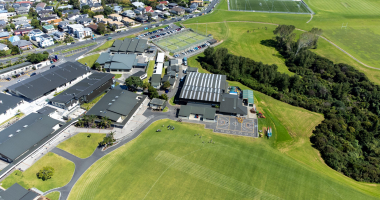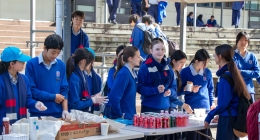Ah yes, the same thing almost every single Macleans College student has experienced, junior milestones! Sitting through that one singular hour with your form class… staring at the ceiling unsure of what to write down in the extended answer section of your science exam. You suddenly begin to realise your distaste for chemistry.
It’s alright, we’ve all been there. I’m sure if you asked any senior here at Macleans, they’ll tell you the same tale about flunking their junior milestones, and completely ‘trolling’ every single one. A lot of the time, navigating different study methods and seeing which one works for you pesters you.
But worry not, as someone who tested multiple ways of studying throughout her first-year experience, I’m sure my wisdom will at least be beneficial to some degree. However, I will admit, most of the strategies I will discuss come from trial and error. Deep… trial and error.
1 – Rewriting your notes over and over again
To be honest, this is what I started out with in Term 1. Especially in science. Yes, isn’t it so joyous and lovely to write out the same ten lab rules over and over again? Until your feeble gel-pen collapses on itself? If anything, it was the complete opposite.
However, when it came down to social studies, I found it at least somewhat useful when preparing all my learned information into a singular paragraph. Still, re-writing your notes over and over again isn’t the same thing. It has to be one of the most tedious ways of studying on this list if I’m going to be real with you. You’re wasting your time – and your hand strength – on rewriting the same notes that you won’t remember most of the time.
Rewriting your notes over and over again can be quite useful for one thing though, and that would be in English. Although English in the junior years isn’t as content-heavy, it’s good for memorising specific quotes and passages you want to use. It’s also a smart strategy for remembering specific definitions, such as ‘What is an atom?’
2 – Rereading your notes over and over again OR highlighting your notes over and over again…
I’m going to keep this section quite short, and simply tell you… no, it doesn’t work. Rereading your notes isn’t working your brain to any extent, if anything, you’re not gaining anything valuable from it. Sure, go ahead, revise and look through your notes for a very quick refresher. However, it should not be your main way of studying.
3 – Flashcards
Now, this has to be the gold mine when it comes to studying. Flashcards are indeed your best friend when it comes to content-heavy sections when learning new subjects. Note: don’t use flashcards for maths.
When it comes to subjects such as the sciences and social studies, flashcards are a foolproof method to memorise and absorb content in a fast and convenient way. Simply, flashcards utilise a concept named ‘active recall’, I’m sure you’ve heard it somewhere. This forces your brain to retrieve information from what you’ve learnt in lessons, which strengthens the connection between your database of knowledge and being able to write it out on paper. They’re also quite easy to use.
Before you immediately get this eureka idea of flashcards and go onto the infamous site called Quizlet, stop right here.
The problem with Quizlet is that it’s a paid service, meaning most of the useful features are paywalled behind subscriptions and need you to enter some debit or credit card details – which I’m assuming many of us at this age don’t have. The function of flashcards is there by itself, yet it’s incredibly limited. Almost all of Quizlet’s useful features are locked behind payment.
Instead, I would recommend an alternative. An application named, ‘Remnote’. Remote is a completely free service. At first, it may seem like a weird application. What is this thing… called… spaced repetition? Essentially, it’s another layer of active recall. Based on how difficult you found the question or flashcard, Remnote utilises the concept and gives you a span of time to not show that card up again to strengthen your knowledge. Cards that you know less about will show up more often in time, and vice versa for the ones you already know. Give it a try – it changes a lot.
4 – Past Papers
Past papers are your saving grace.
Well, unless they’re outdated.
Here’s the thing, past papers are only useful when they’re recent enough that it’s still viable for you to use to study. Oftentimes, the school changes the syllabus around to improve it for future students; still though, there’s at least some value in older papers for the questions still relevant today.
Maths is probably the most applicable subject when it comes to past papers. A lot of the time, you’ll find yourself looking at the exercise sheets and finding them too easy for your liking. That is when you accelerate yourself to past papers, trying out the multi-layered word questions for you to solve. This is due to the fact that the most viable way to study maths is to do things over, and over again. Not reading your theory notes over and over again. It’s doing the worksheet over and over again.
There’s my two cents on study techniques. Hopefully, you’ve gained some insight and wisdom on how to better prepare for your milestones this year. May 2024 bring glorious academia to everyone!
Written by Emma Li, edited by Hope Zhang and Aaron Huang
Photo by Syd Wachs on Unsplash









